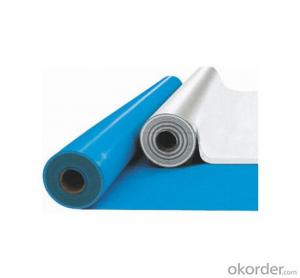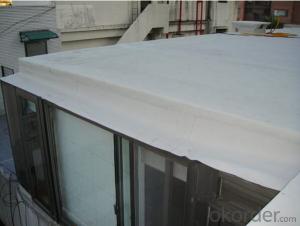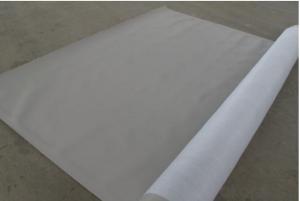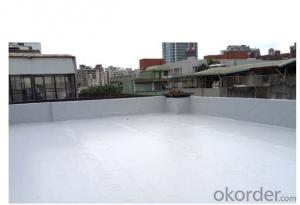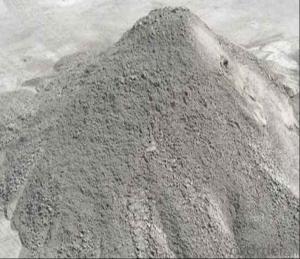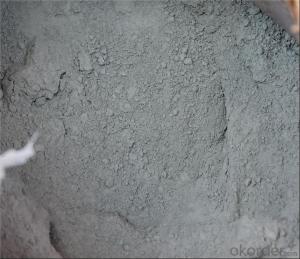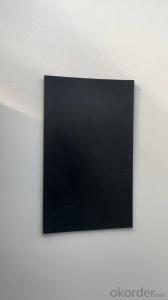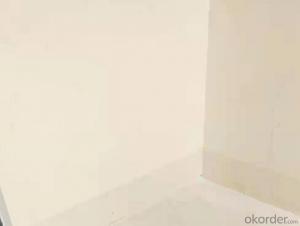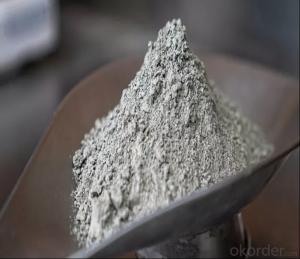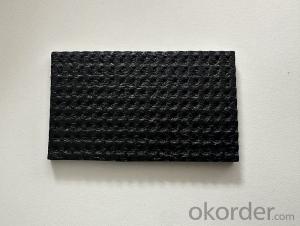PVC Roofing Waterproof Plastic Membrane Best Quality
- Loading Port:
- Qingdao
- Payment Terms:
- TT OR LC
- Min Order Qty:
- 3000 m²
- Supply Capability:
- 300000 m²/month
OKorder Service Pledge
OKorder Financial Service
You Might Also Like
Introduction of PVC Waterproof Membrane
It is an excellent high quality polymer waterproof sheet, made of PVC resin by adding plasticizer, anti-UV agent, anti-aging agent, and stabilizer and other processing aids through extrusion and molding.
As the highly recommended product by the Ministry of Consturction, it is featured by high tensile strength, great elongation, good stability, small shrinkage, low temperature performances, good resistance to weathering and root penetration and long service life.
.
Features of PVC Waterproof Membrane
1)Excellent aging resistance. Service life of roofing material is over 20 years; service life of underground material is over 50 years.
2)Root resistant penetration, specially used on planting roofings.
3)Welding installation. Joints are solid and environment friendly, no pollution.
4)High tensile strength, good elongation and dimensional stability.
5)Good plasticity, easy and suitable for details installation.
6)Fireproof. Fire extinguished out of the ignition resource.
7)Surface is smooth, no fading and dirty resistant.
8)Width is over 2m. Construction wastage is small, more economical.
Classification and Specification of PVC Waterproof Membrane
N: Homogeneous PVC membrane
L: PVC membrane with fabric backing
W: Reinforced PVC membrane
Thickness: 1.2mm/1.5mm/2.0mm
Size: 2.05mx20m
Color: white/grey, or any other colors.
Advantage of PVC Waterproof Membrane
1.) Mixing automation. Apply automatic temperature control automatic time control and automatic feed control.
2.) Extrusion equipment uses twin screw coextrusion. Screw temperature uses computer automatic temperature control system.
3.) Handpiece uses large width didhead extrusion equipment.
4.) Sophisticated three-roller calender equipment. The space between equiment is controlled by automation system.
Application of PVC Waterproof Membrane
PVC membrane applies special formula and its service life is much longer than other general waterproof membranes. Its excellent performance makes it be widely used in every field.
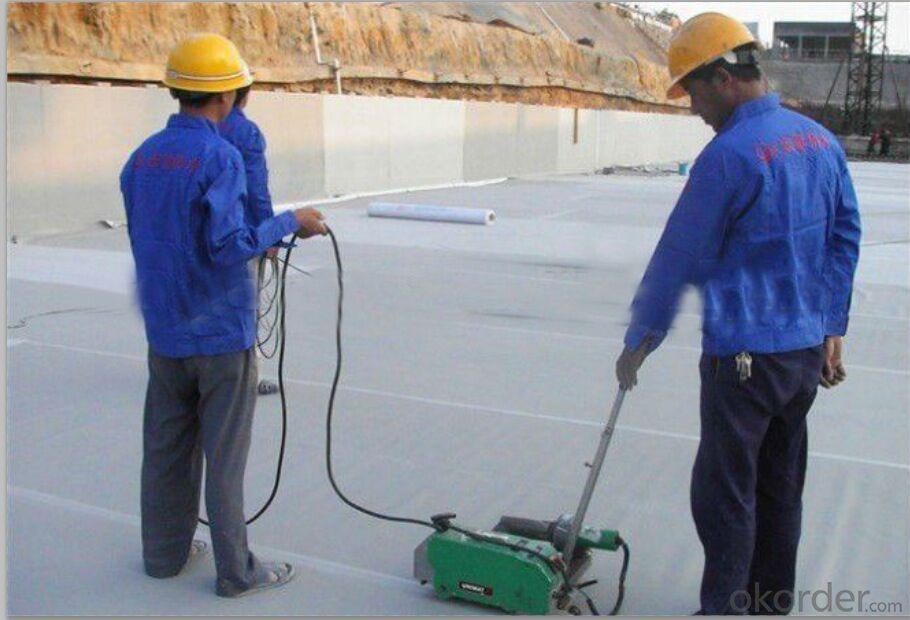
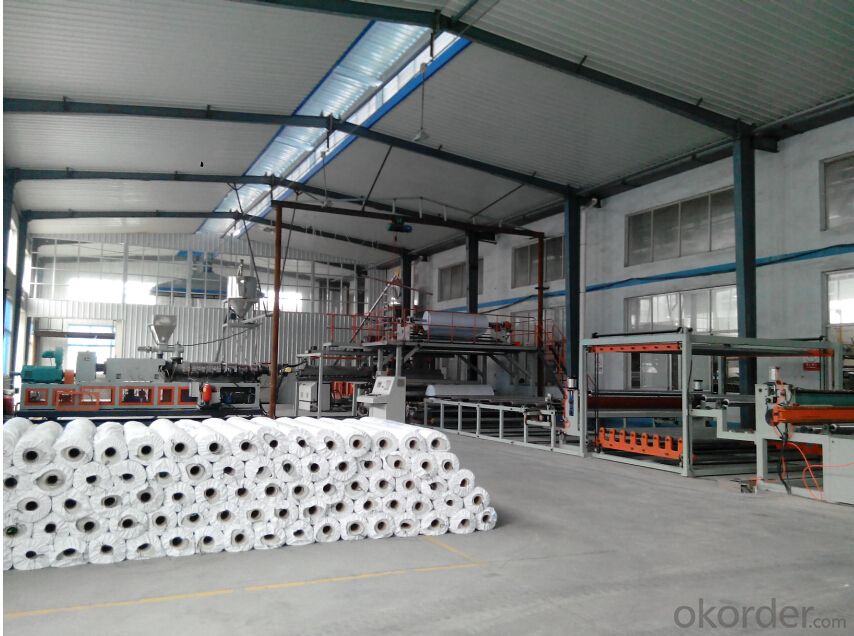
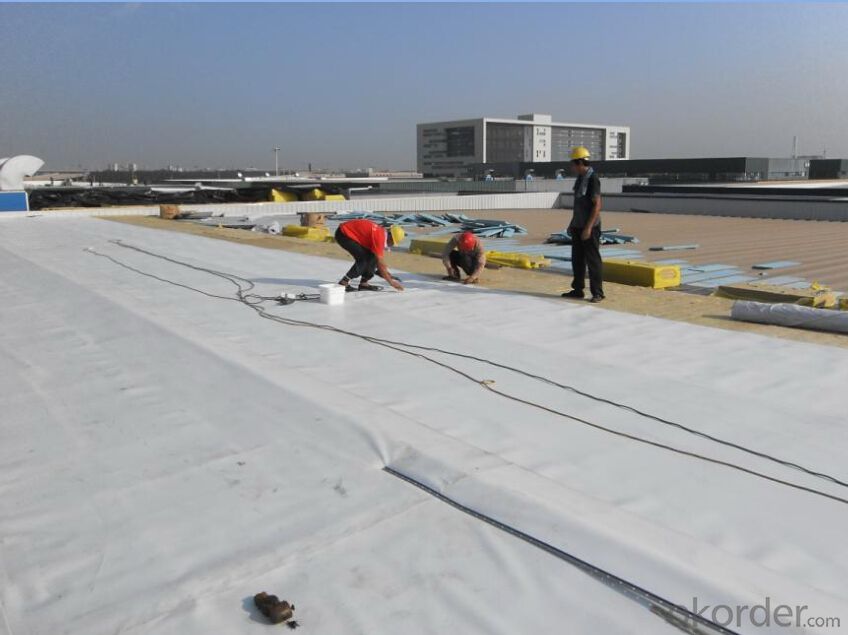
FAQ:
Can you produce 4m width?
Yes, no problem for us. We have four bases in China, largest one in this field.
How many quantity in one 20'' container for 1.2mm and 1.5mm?
480rolls, 11520m2 for 1.2mm and 400rolls, 9600m2 for 1.5mm
Can you provide free samples?
Yes, our samples are free, but express fees usually on buyer's account.
- Q:How does a waterproofing membrane handle settlement or movement of the substrate?
- A waterproofing membrane is designed to handle settlement or movement of the substrate by providing flexibility and elasticity. It is typically made from materials such as modified bitumen, polyurethane, or acrylic polymers, which have the ability to stretch and contract without compromising the integrity of the membrane. When there is settlement or movement in the substrate, the waterproofing membrane can accommodate these changes by adjusting its shape and size accordingly. This prevents the membrane from cracking or tearing, which could lead to water infiltration and damage to the underlying structure. Additionally, some waterproofing membranes have reinforcing layers or fabrics embedded within them to enhance their strength and resistance to movement. These reinforcement layers help distribute stress and forces caused by settlement or movement, further protecting the membrane from potential damage. Furthermore, proper installation techniques are crucial to ensure the waterproofing membrane can effectively handle settlement or movement. The membrane should be applied in a continuous and seamless manner, using appropriate adhesives or fasteners to secure it to the substrate. This ensures that the membrane can flex and move with the substrate, rather than resisting or restricting its movements. In summary, a waterproofing membrane is designed to accommodate settlement or movement in the substrate by providing flexibility, elasticity, and reinforcement. Proper installation techniques are essential to ensure its effectiveness in handling these movements and maintaining a watertight barrier.
- Q:Can a waterproofing membrane be installed in areas with high humidity?
- Yes, a waterproofing membrane can be installed in areas with high humidity. In fact, it is even more important to have a waterproofing membrane in such areas to prevent moisture infiltration and potential damage to the structure.
- Q:How long do waterproofing membranes last?
- The lifespan of waterproofing membranes can vary depending on various factors such as the type of membrane used, the quality of installation, environmental conditions, and maintenance practices. Generally, high-quality waterproofing membranes can last anywhere from 10 to 50 years. For example, bituminous membranes, which are commonly used in roofing applications, typically have a lifespan of around 20 to 30 years. On the other hand, more advanced synthetic membranes like PVC or TPO can last up to 40 years or even longer. However, it's important to note that these estimations are based on ideal conditions and regular maintenance. Factors such as exposure to extreme weather conditions, improper installation, lack of maintenance, or physical damage can significantly reduce the lifespan of the membranes. Therefore, it is crucial to consult with professionals and follow manufacturer's recommendations for maintenance to ensure the longevity of the waterproofing membranes.
- Q:Can a waterproofing membrane be used for shopping malls or commercial buildings?
- Indeed, shopping malls or commercial buildings can utilize a waterproofing membrane. In construction, waterproofing membranes serve as a prevalent method to safeguard structures from water-related harm. These membranes possess tailored designs that facilitate the creation of barriers against water infiltration, effectively preventing leaks and the accumulation of moisture. Through the application of a waterproofing membrane to the exterior of a building, the longevity and durability of the structure are safeguarded. Given the considerable surface areas of shopping malls and commercial buildings, which are often exposed to varying weather conditions, they become particularly susceptible to water damage. Consequently, employing a waterproofing membrane emerges as a highly efficient solution to shield these buildings and uphold their structural integrity.
- Q:Can a waterproofing membrane be used for parking garages?
- Yes, a waterproofing membrane can be used for parking garages. Waterproofing membranes are commonly used in construction to prevent water infiltration and damage to structures. Given the potential exposure of parking garages to water from rainfall, snowmelt, or vehicle fluids, using a waterproofing membrane can help protect the structural integrity of the garage and extend its lifespan.
- Q:Can waterproofing membranes be used on foundation walls?
- Indeed, it is possible to utilize waterproofing membranes on foundation walls. These membranes possess a specific design that aims to impede the infiltration of water and are commonly employed on foundation walls to safeguard against moisture and water-related harm. Typically, these membranes consist of resilient materials like rubberized asphalt, thermoplastic, or PVC, which exhibit durability and resistance to water penetration. The installation of these membranes occurs on the outer side of the foundation walls, thereby serving as a highly efficient barrier against water, effectively averting its seepage into the basement or crawl space. Without a doubt, waterproofing membranes constitute an indispensable element in the realm of building construction, as they actively contribute to the preservation of the foundation's structural integrity, preventing adverse consequences such as water damage, mold growth, and foundation settlement.
- Q:Can a waterproofing membrane be used on precast stone block surfaces?
- Precast stone block surfaces can benefit from the application of a waterproofing membrane. These membranes are frequently utilized to safeguard a variety of surfaces, including precast stone blocks, from water infiltration and moisture harm. The purpose of these membranes is to establish a barrier that prevents water from seeping into the surface and causing problems like mold, decay, or structural deterioration. By applying a waterproofing membrane to precast stone block surfaces, their durability and lifespan can be improved by shielding them from water-related difficulties. However, it is crucial to diligently adhere to the manufacturer's instructions and ensure that the chosen waterproofing membrane is appropriate for the specific type of precast stone block surface being treated.
- Q:Can a waterproofing membrane be used for a swimming pool liner?
- Yes, a waterproofing membrane can be used for a swimming pool liner. In fact, it is a common and effective solution for creating a watertight seal in swimming pools. Waterproofing membranes are designed to be durable and resistant to water penetration, making them an ideal choice for lining pools. They provide a protective barrier that prevents water from seeping into the ground, which can cause structural damage and leaks. Additionally, waterproofing membranes can be customized to fit any pool size and shape, ensuring a perfect fit and maximum waterproofing performance. Overall, using a waterproofing membrane as a swimming pool liner is a reliable and cost-effective solution to maintain the integrity and longevity of the pool structure.
- Q:Can a waterproofing membrane be used for a basement wall?
- Yes, a waterproofing membrane can definitely be used for a basement wall. In fact, it is highly recommended to use a waterproofing membrane on basement walls to prevent water infiltration and potential damage. Basement walls are particularly vulnerable to moisture due to their below-ground location, and a waterproofing membrane provides an effective barrier against water penetration. This membrane is typically applied to the exterior side of the basement wall, creating a protective layer that keeps the basement dry and prevents water from seeping into the foundation. It is essential to ensure proper installation and maintenance of the waterproofing membrane to effectively safeguard the basement from water-related issues such as leaks, mold, and structural damage.
- Q:Are waterproofing membranes resistant to mineral oils?
- Yes, waterproofing membranes are generally resistant to mineral oils.
1. Manufacturer Overview |
|
|---|---|
| Location | |
| Year Established | |
| Annual Output Value | |
| Main Markets | |
| Company Certifications | |
2. Manufacturer Certificates |
|
|---|---|
| a) Certification Name | |
| Range | |
| Reference | |
| Validity Period | |
3. Manufacturer Capability |
|
|---|---|
| a)Trade Capacity | |
| Nearest Port | |
| Export Percentage | |
| No.of Employees in Trade Department | |
| Language Spoken: | |
| b)Factory Information | |
| Factory Size: | |
| No. of Production Lines | |
| Contract Manufacturing | |
| Product Price Range | |
Send your message to us
PVC Roofing Waterproof Plastic Membrane Best Quality
- Loading Port:
- Qingdao
- Payment Terms:
- TT OR LC
- Min Order Qty:
- 3000 m²
- Supply Capability:
- 300000 m²/month
OKorder Service Pledge
OKorder Financial Service
Similar products
New products
Hot products
Related keywords
